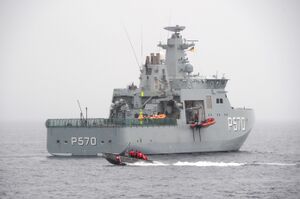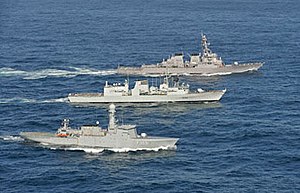Operation Nanook (2010)
Template:Other uses Template:Otheruses

Template:Commonscat Template:Commonscat Operation Nanook 2010 was the 2010 annual joint exercise of Canada's Maritime Command and the Canadian Coast Guard to train for disaster and sovereignty patrols in the Arctic.[1][2][3][4] Similar exercises were held in 2007, 2008 and 2009.
The operation ran from August 6 2010 to August 26, 2010.[1][3]
Canadian Prime Minister Stephen Harper traveled to the Arctic.[1][2] Unlike previous exercises, foreign services participated.
Participating forces
The Royal Danish Navy, sent the HDMS Vædderen and the HDMS Knud Rasmussen.[4].[5] The [[HDMS Vædderen (F359)|HDMS Vædderen is a frigate sized Thetis-class ocean patrol vessel, launched in 1996. The Knut Rasmussen is a new vessel, commissioned in 2008, the lead ship of a class specifically designed to patrol Baffin Bay.
The United States sent the USS Porter and the USCGC Alder. The USS Porter is a United States Navy Guided Missile Destroyer commissioned in 1999. The USCGC Alder is United States Coast Guard buoy tender homeported in Duluth, on the Great Lakes.
Canada sent the HMCS Montréal, HMCS Goose Bay, HMCS Glace Bay, and the CCGS Henry Larsen. The HMCS Montréal is a Halifax class frigate, commissioned in 1993. The Goose Bay and the Glace Bay are Kingston class coastal defence vessels, commissioned in 1996 and 1998. The Henry Larsen is the only icebreaker among the vessels.
Commentary
The Russian Newspaper Pravda described the exercise as "saber rattling".[1]
References
- ↑ 1.0 1.1 1.2 1.3 Arctic: Canada's Sabre-Rattling and Russia’s Strategic Interests, Pravda, 2010-08-31. Retrieved on 2010-09-22. “The recently completed Operation Nanook (August 6 to 26), an operation which Canada began after Russia made claims to Arctic territories in 2007, involved an unprecedented degree of collaboration among military forces from Canada, the USA and Denmark: NATO member states. Yet is there not a commercial interest behind the sabre-rattling?” mirror
- ↑ 2.0 2.1 Anita Dey Nuttall. Canada stakes a claim to Arctic power, influence: Military operation, policy announcements show Ottawa's resolve, Edmonton Journal, 2010-08-28. Retrieved on 2010-09-20. “As the Canadian military exercise Operation Nanook 10 drew to a close this week and Prime Minister Stephen Harper travelled in Canada's North, the federal government made two key announcements that sum up the country's main Arctic priorities.” mirror
- ↑ 3.0 3.1 Jordan Woodman. The CH-146 Griffon makes its debut at Op Nanook, Aviation.ca, 2010-08-26. Retrieved on 2010-09-20. “This year the CH-146 Griffon helicopter took part in Operation Nanook for the first time, providing a tremendous boost to the air component of this annual Canadian Forces (CF) northern sovereignty operation.” mirror
- ↑ 4.0 4.1 Canada Command - OP Nanook, Canadian Armed Forces, 2010-08. Retrieved on 2010-09-22. mirror
- ↑ 100816-G-4702D-012 Operation Nanook, Ninth District Public Affairs, US Coast Guard. Retrieved on 2010-09-22. mirror
